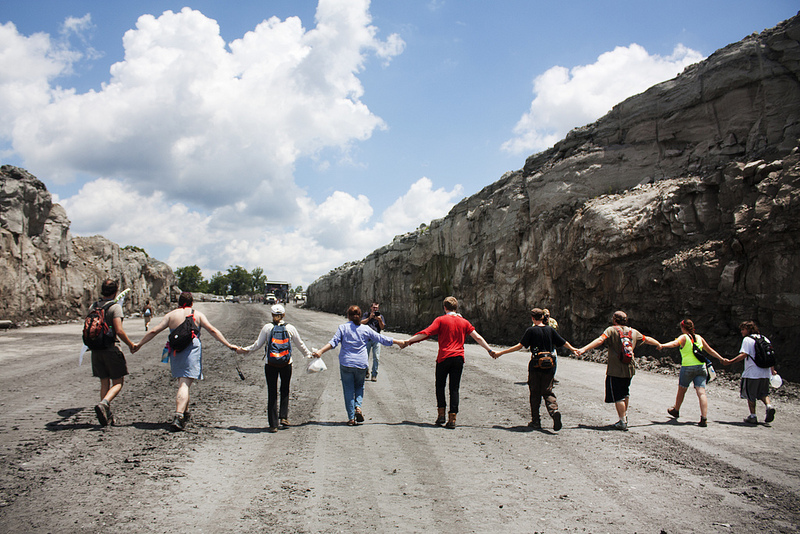By Charles Suggs, RAMPS organizer
More than 50 protesters affiliated with the R.A.M.P.S. Campaign have walked onto Patriot Coal’s Hobet mine and shut it down. Ten people locked to a rock truck, boarded it and dropped banners: ”Coal Leaves, Cancer Stays.” At least three have been arrested, with another in a tree being threatened by miners with a chain saw. Earlier in the day, two people were arrested at Kanawha State Forest before a group of protesters headed to the state capitol.
“The government has aided and abetted the coal industry in evading environmental and mine safety regulations. We are here today to demand that the government and coal industry end strip mining, repay their debt to Appalachia, and secure a just transition for this region,” Dustin Steele of Matewan, W.Va. said. Steele was one of the people locked to the rock truck.
Mounting scientific evidence shows that strip mining negatively impacts community health and miner health. Recent studies have found a 42 percent increase in risk of birth defects around strip mines, and miners who spend at least 20 years as strip-mine drillers have a 61 percent chance of contracting silicosis, a virulent form of black lung. “The coal companies are poisoning our water and air, and they’re treating the workers no better than the land – fighting workplace health and safety protections to get the most out of labor as they can,” said Junior Walk of Whitesville, W.Va.
As coal production declines, protesters are concerned that the region will be left with only illness and environmental devastation as the industry pulls out of the region and companies file for bankruptcy to shed legacy costs.
Patriot Coal is currently going through Chapter 11 bankruptcy, in which union contracts and pensions could be on the chopping block. Both UMWA pensions and the state’s Special Reclamation Fund are funded through a per-ton tax on coal. With Central Appalachian coal production in the middle of a projected six-year, 50 percent decline, this funding stream is increasingly unsustainable. Protesters are calling on the coal industry and government to ensure that funding is available both to honor commitments to retired workers and to restore the land.
“Coal companies must employ their surface mine workers in reclaiming all disturbed land to the highest standards. Instead of arguing about the ‘war on coal,’ political leaders should immediately allocate funds to retrain and re-employ laid off miners to secure a healthy future for the families of this region,” said R.A.M.P.S. spokesperson Mathew Louis-Rosenberg.
Appalachian communities, from union miners to the anti-strip mining activists of the 1960s, have a proud history of confronting the coal industry and demanding an end to its exploitive practices with direct civil disobedience. R.A.M.P.S. and other campaigns have returned to this tradition to eliminate strip mining once and for all. Since its founding in 2011, R.A.M.P.S. has organized a range of actions, from tree-sits to blockades of coal trucks.
Today’s protesters are among the hundreds of people across the country who are joining this summer’s National Uprising Against Extraction, using radical tactics to fight oppressive extractive industries and demand a transition to a sustainable economy.
From We Are Power Shift:
You can help support RAMPS by making a donation here: https://www.wepay.com/donate/57022?ref=widget&utm_medium=widget&utm_campaign=donation


I was in attendance saturday and the dragline never stopped operating, so calling this action a shutdown is a stretch. I also see nothing in this story about the protesters taking control of a truck full of explosives and opening the primer box. Still see nothing dangerous about these invasions? I’ve said it before, one of these young people is going to be either injured or,god forbid killed and who will take responsibility then?